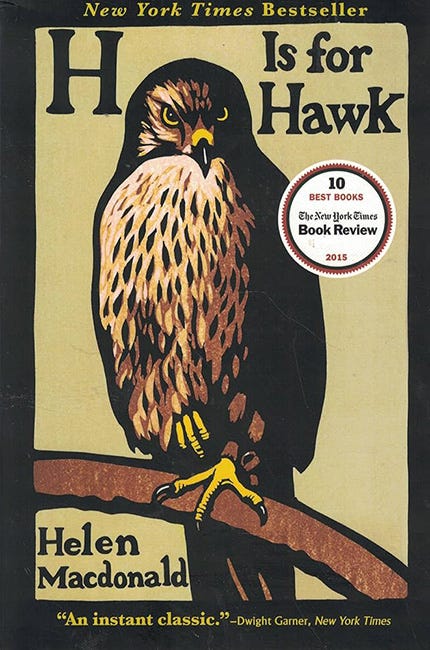H is For Hawk, Helen MacDonald (2016)
H is For Hawk, Helen MacDonald (2016). A beautifully written memoir of grief and recovery after the death of the author’s father, as processed through her relationship with, and training of, a goshawk named Mabel. H is for Hawk also combines MacDonald’s own falconry experiences with those of English author T. H. White, best known for the Arthurian fantasy novel The Once and Future King, who wrote a little-read account of his ill-fated training of a goshawk in 1951.
White’s personal traumas and neuroses, his fraught and confused sexuality, his broken family background, all colored his adventure in falconry, much as MacDonald’s daughterly grieving formed the context for her intimate entanglement with Mabel. In a way the book rests on a sort of triangle: Helen, Mabel, and White, all uncertainly navigating the dichotomy between wildness and domestication. And all described in some very intense, wildly beautiful prose, with powerful descriptions of nature and long musings on family, loss, and our relationship to the natural world.
I feel like I rushed through the book (even though it took me a week and a half to complete). My utter ignorance of anything to do with falconry, which is apparently more common a pastime than I realized, also made it a little bit of a struggle - compounded by the fact that there is an entire esoteric vocabulary associated with hawks and their training and hunting. I was resorting to looking up YouTube videos of hawks bating and grousing to be able to picture Mabel’s behavior to my satisfaction. Nonetheless, MacDonald’s fascination with these wild and beautiful predators is contagious, and although there’s more to it than just this, H is For Hawk is a lovely elegy to the deep mysterious connection between hawks, falcons, eagles, and their human appreciators.
MacDonald is also a historian, and the book is also infused with a profound awareness of the past - among other topics, the book delves into the natural history of the English countryside, the aviation of the Second World War, the Arthurian mythic past as seen through White, and of course the long history of falconry itself. Her interest in White both as a historical and literary figure and as a falconer also makes complete sense given MacDonald’s academic orientation; and, speaking of that, Cambridge also plays a role, mostly in the background, but we are very clearly in the realm of letters and ideas throughout the narrative. Ultimately H is for Hawk may be a little esoteric for some readers, but beyond the falconry aspects, it’s a beautiful meditation on loss and recovery that anyone who’s ever grieved will relate strongly to. (Read mid-August, 2024)




